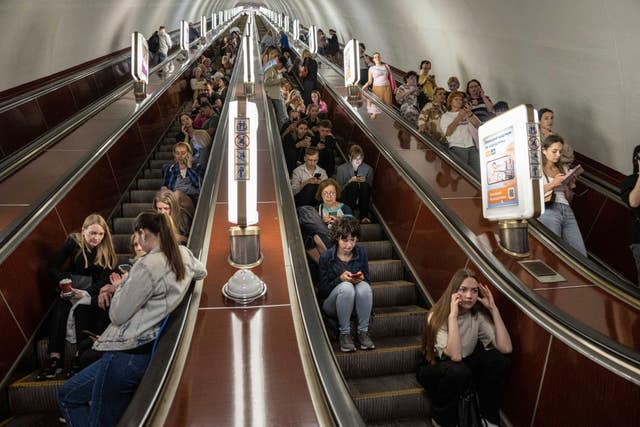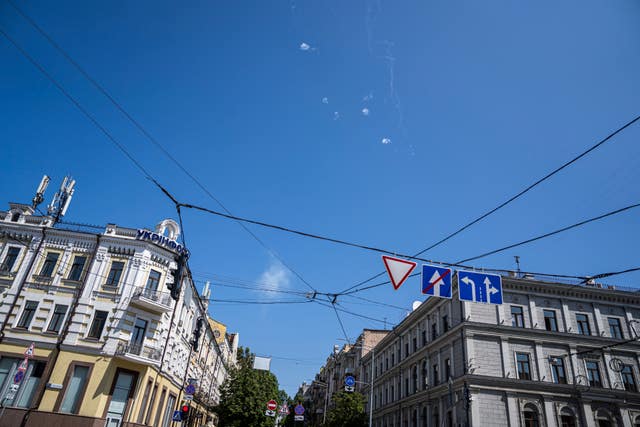Russia strikes Kyiv in daylight after series of nighttime barrages
Russian forces fired 11 ballistic and cruise missiles at Kyiv at about 11.30am (8.30am GMT), according to Ukraine’s chief of staff Valerii Zaluzhnyi.
Explosions have rattled Kyiv during daylight as Russian ballistic missiles took aim at the Ukrainian capital – hours after a more common nighttime barrage of the city by drones and cruise missiles.
Russian forces fired 11 ballistic and cruise missiles at Kyiv at about 11.30am (8.30am GMT), according to Ukraine’s chief of staff Valerii Zaluzhnyi.
All were shot down, he said, and puffs of white smoke could be seen in the blue sky over the city from street level.
Debris from the intercepted missiles fell in Kyiv’s central and northern districts during the morning, landing in the middle of traffic on a city road and starting a fire on a building’s roof, the Kyiv military administration said.
The blasts unnerved some locals, already under strain after being awakened by the night attack.
“After what happened last night, I react sharply to every siren now. I was terrified and I’m still trembling,” said Alina Ksenofontova, a 50-year-old woman who took refuge in the Kyiv subway with her dog Bublik.
The central station, Tetatralna, was crowded with sheltering locals.
Artem Zhyla, a 24-year-old who provides legal services abroad, took his laptop with him and kept working underground.
“I heard two or three explosions, went to the bathroom and then I heard five or seven more explosions. That’s when I realised something terrible was happening,” he said.

“This is certainly not enough to break us,” he said.
Russia used Iskander short-range missiles in the morning attack, the spokesman for Ukraine’s air force said on local television.
Ukraine President Volodymyr Zelensky and first lady Olena Zelenska both posted a video of what they said were frightened schoolchildren running and screaming down a Kyiv street toward a bomb shelter as sirens wail.
“This is what an ordinary weekday looks like,” the president wrote on Telegram.
The missiles were fired from north of Kyiv, the head of Ukraine’s air force Yurii Ihnat said without clarifying if he meant Russian territory.
Kyiv is around 236 miles from the Russian border.
The Russian Defence Ministry said early on Monday it launched a series of strikes targeting Ukrainian air bases with precision long-range air-launched missiles.
The strikes destroyed command posts, radars, aircraft and ammunition stockpiles, it claimed.
It did not say anything about hitting cities or other civilian areas.
Ukrainian foreign minister Dmytro Kuleba warned against indifference, saying the repeated strikes on civilian areas amount to “war crimes”.
“Russia’s drone and missile attacks on peaceful Ukrainian cities cannot be seen as usual, no matter how frequent they grow,” he tweeted in English.
During the previous night, Ukraine air defences brought down more than 40 targets as Russian forces bombarded Kyiv with a combination of drones and cruise missiles in their 15th nighttime attack on the capital so far this month, said Serhii Popko, the head of Kyiv’s military administration.
On Saturday night, Kyiv was subjected to the largest drone attack since the start of Russia’s war. At least one person was killed, local officials said.
Kremlin’s strategy of long-range bombardment has brought many sleepless nights for Ukrainians.
Over the winter, Russian forces aimed their missiles and drones at power stations and other infrastructure.
The apparent goal was to weaken Ukraine’s resolve and compel the Ukrainian government to negotiate peace on Moscow’s terms, but Ukrainians swiftly and defiantly repaired the damage.
In recent months, Ukraine has been receiving advanced air defence systems from its western allies, improving its ability to fend off bombardments by the Kremlin’s forces.
The head of the International Atomic Energy Agency (IAEA) will speak on Tuesday at the United Nations Security Council about safety at the Zaporizhzhia nuclear power station, which is under Russian control and endangered by the fighting.
Mikhail Ulyanov, Russia’s ambassador to international organisations in Vienna, said IAEA head Rafael Grossi is expected to “set out specific ideas” about how to strengthen security at the plant, which is Europe’s largest nuclear power station.
Across the country, the Ukrainian air force said that over Sunday night it shot down 37 out of 40 cruise missiles and 29 out of 35 drones launched by the Kremlin’s forces.
Four civilians were killed and around two dozen others were hurt, including three children and a pregnant woman, in Russian shelling elsewhere across the country, authorities said.
Russia warplanes dropped bombs on the town of Toretsk on Monday afternoon, killing three civilians, Donetsk regional governor Pavlo Kyrylenko said.

Meanwhile, in the Belgorod region of Russia on the border with Ukraine, one person was killed by Ukrainian shelling of the village of Grafovka, according to governor Vyacheslav Gladkov.
Russian missiles also slammed into a military airport in the western Khmelnytskyi region of Ukraine, destroying five aircraft and damaging the runway, local governor Serhyi Hamaliy said on television.
The strike sparked fires at nearby warehouses storing fuel and military equipment, he added.





